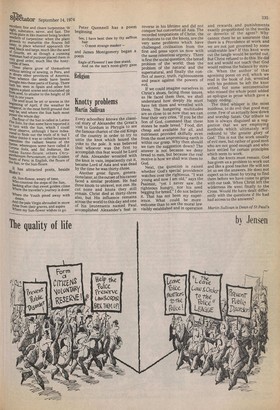Religion
Knotty problems Martin Sullivan
Every schoolboy knows the classical story of Alexander the Great's visit to Gordum in Phrygia to see the famous chariot of the old Kings of the country in order to try to untie the knot which bound the yoke to the pole. It was believed that whoever was the first to . accomplish this feat would be Lord of Asia. Alexander wrestled with the knot in vain, impatiently cut it, became Lord of Asia and was dead by the time he was thirty-three.
. Another great figure, generations later, at the outset of his career faced a similar problem. He had three knots to unravel, not one. He cut none and knots they still remain. Christ died at thirty-three also, but His influence remains across the world to this day and one of his lieutenants named Paul, accomplished Alexander's feat in reverse in his lifetime and did not conquer but converted all Asia. The recorded temptations of Christ, the invitations to cut the knots, are the very same problems which have challenged civilisation from the first and press upon us now with the same relentless urgency. There is first the social question, the bread problem of the world; then the problem of the natural and the supernatural, and finally the conflict of mercy, truth, righteousness and peace against the powers of evil.
If we could imagine ourselves in Christ's shoes, facing these issues, as He faced them then, we shall understand how deeply He must have felt them and wrestled with them. The hungering multitudes are so close to us now that we can hear their very cries, "If you be the Son of God, command that these stones be made bread." Food, dirt cheap and available for all, and nutriment provided skilfully even from the most unpromising earth is within our grasp. Why then should we turn the suggestion down? The answer is not because we deny bread to men, but because the real motive is how we shall win them to God.
Next, the question is raised whether God's special providence watches over the righteous. "I was young and now I am old," says the Psalmist, "yet I never saw the righteous hungry, nor • his seed begging for bread." I do not believe it. That has not been my experience. What could be more welcome than to see the moral law visibly established and in operation
and rewards and punishments exactly proportioned to the merits or demerits of the agent? Why cannot there be an assurance that there is a Providence at work and we are not just governed by some unalterable law? If this knot were cut the tangle would be sorted out. But Christ refused to do this. He did not and would not teach that God would redress the balance by miracle. When the author of that agonising poem on evil, which we read in the book of Job, wrestled with his problem he left the knot untied, but some sentimentalist who missed the whole point added an epilogue in prose which gave a happy ending.
The third whisper is the most insidious, to do evil that good may come. Few of us actually bow down and worship Satan. Our tribute to him is always disguised as a suggestion that we are employing methods which ultimately will redound to 'the greater glory of God.' This is not the work usually of evil men, but rather of good men who are not good enough and who have settled for certain principles which seem to work.
But the knots must remain. God has given us a problem to work out and like a good teacher He will not let us see the answers. He does not expect us to cheat by trying to find them before we have come to grips with our task. When Christ left the wilderness He went finally to the Cross. Would He have dealt differently with the questions if He had had access to the answers? .
Martin Sullivan is Dean of St Paul's


































































 Previous page
Previous page